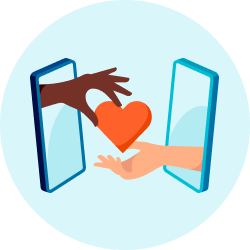Relaxation Techniques
Stress is a natural part of life, and how we choose to manage it is critical to our wellbeing. Knowing how and when to practice relaxation can help you manage stress in healthy ways.
The Stress/Relaxation Relationship
Our body’s reaction to stress is called the “fight or flight” response. Hormones are released. Energy pumps to our heart and muscles so we can act. While short-term stress can increase productivity and performance, continual stress without relief takes its toll on our physical and mental health and contributes to a number of medical issues, including:
- high blood pressure
- bowel conditions
- hypertension
- strokes
Relaxation techniques produce the body’s natural relaxation response. Practicing these skills can:
- slow breathing and heart rates
- lower blood pressure
- reduce headaches
- help with insomnia
- improve concentration
- reduce chronic pain
- help with fatigue
- lessen irritability
- decrease muscle tension
- improve overall health
Types of Relaxation Techniques
Regardless of where you land on the stress spectrum—from feeling overwhelmed to managing your stress well—the following activities will reduce the effects of stress on your mind and body. Consider incorporating one or more into your daily routine.
- Autogenic relaxation. People who practice this form of body awareness relaxation focus on peaceful images or words while tuning in to their breathing, heart rate, and physical sensations.
- Progressive muscle relaxation. With this technique, you slowly tense and relax individual muscles. Start with your feet and work up to your head. This practice teaches awareness of muscle tension.
- Biofeedback. There are electronic devices you can use to measure physical responses to stress. With instant feedback, you can take notes on what exercises relax you the most.
- Guided imagery. Begin by replacing negative images with positive, peaceful ones. For example, you might envision a day at the beach or relaxing in a hammock.
- Music. Listening to music can lower your heart rate and blood pressure. Focus on the music, and sing along if possible.
- Laughter. Watch your favorite comedy or hang out with fun friends. Laughter lowers your body’s stress hormone (cortisol) and promotes brain chemicals (endorphins) to lift your mood.
- Gratitude. There’s much to be said for approaching life with a positive attitude and good perspective. Writing down what we’re grateful for or even sending a thank-you message to someone can help remind us of what’s truly important.
- Mindfulness. Use your senses to focus on what’s in front of you. Practice being present in your relationships, at work, and by yourself. Push aside thoughts about your to-do list, future events, and your past. Try keeping your thoughts on the here-and-now.
These exercises can be done alone or with the help of another person. If you’re not sure where to start, check out programs and classes in your community that offer yoga, meditation, and art therapy. Consider downloading an app or searching for guided exercises online. Different exercises work for different people, so keep trying until you find a technique that works best for you.
Keep in Mind
Relaxation techniques are most effective combined with other tools for healthy living, such as proper rest, a healthy diet, and exercise. While these techniques won’t eliminate the stress in your life, they will help in managing your stress load and symptoms. Relaxation techniques are low-cost, low-risk for injury, and can be performed almost anywhere. There is nothing to lose and everything to gain. If you need more help, ask a loved one or counselor for support. Relaxation techniques are not a substitute for medical treatment in the event of an illness. Seek medical attention when necessary.
Sources:
National Institute of Health. Relaxation techniques: What you need to know. Accessed February 6, 2023. http://nccam.nih.gov/health/stress/relaxation.htm
Mayo Clinic. Relaxation techniques: Try these steps to reduce stress. Accessed February 6, 2023. http://www.mayoclinic.org/healthy-living/stress-management/in-depth/relaxation-technique/art-20045368
MedlinePlus. Relaxation techniques for stress. Accessed February 6, 2023. https://medlineplus.gov/ency/patientinstructions/000874.htm#:~:text=When%20you%20feel%20stress%2C%20your,is%20called%20a%20relaxation%20response

